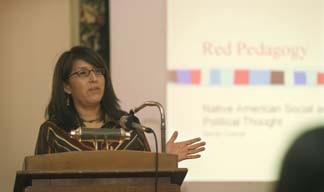Educator Grande wants to rethink U.S. democracy in accounting for treatment of Native Americans
By Daniel Aloi
Author and educator Sandy Grande wants to see the teaching of American history reframe the nation's identity as a democracy in order to consider its legacy of genocide and colonization.
Her proposal to radically rework education in America from an ideological standpoint has been bolstered by recent events that, she says, underscore America's history of colonialism and its treatment of Native Americans.
"American Indian tribes -- as internal sovereigns -- are viewed as inherently destabilizing to democracy, defying the principle of America as one people, one nation," said Grande, an associate professor of education at Connecticut College, in her lecture, "At the Crossroads of Democracy and Sovereignty: The Indigenization of America," on Dec. 1 at Cornell University's A.D. White House. Cornell's American Indian Studies Program hosted Grande on campus Dec. 1-2.
"The United States is a nation defined by its original sin: the genocide of American Indians -- and everything afterwards [is] just another chapter in the fall from grace," she said. "One of the questions that dominates throughout is whether it's possible for democracy to grow from the seeds of tyranny -- if the good life can be built upon the deaths of thousands."
Grande provided a litany of recent events including Hurricane Katrina and the response of the Federal Emergency Management Agency ("a monstrous natural disaster which exposed an even greater national disgrace -- centuries of indifference toward poor Americans, African Americans, disabled and elderly Americans"); "post-9/11 imperialism"; a police raid on the Naragansett reservation in Connecticut in a challenge to sovereignty; "and on the public school frontier, the infiltration of intelligent design, Pat Robertson and the slowly vanishing line between church and state."
She said she had noticed such threads as "a continual undermining of women and people of color" and increased corporate and governmental opposition to tribal recognition. She set out to connect official post-9/11 statements about terrorism and patriotism to "the pernicious evidence of colonialism masked as benevolent democracy."
"I saw a kind of synchronicity," Grande said. "And while they seemed disparate, they were all related. And all roads seemingly leading to Indian country."
The aftermath of Katrina weighed heavily in her examples.
"The last time thousands of people were forced to relocate under military command was in 1838," she said, referring to the "Trail of Tears" in which nearly 4,000 Cherokees died while traveling 1,000 miles on foot from Georgia to Oklahoma.
Grande's lecture was based upon her 2004 book "Red Pedagogy: Native American Social and Political Thought" (Rowman & Littlefield). The book engages a conversation between critical, feminist, indigenous and Marxist theories of education and Native American perspectives, exploring the tensions and intersections between them.
"The primary project is decolonization," she said of her proposal. "If we seek a turn toward genuine democracy, it will be imperative for schools to be reimagined as sites for social transformation. The imperative before us -- particularly indigenous scholars -- is to engage a process of unthinking our colonial roots and rethinking democracy."
Indigenous peoples, she said, don't view colonization as "just a class thing, a race thing, a liberal thing, a conservative thing. The sad reality is colonialism is all of these things, the whole of its power greater than the sum of its parts."
In her Dec. 2 seminar in Caldwell Hall, Grande spoke on "Whitestream Feminism and the Colonialist Project: Toward a Theory of Indigenísta ." She weighed feminist theory based primarily on gender inequality against the real lives of American Indian women, who are subject not to a universal patriarchy but to the historical and material implications of colonization.
Media Contact
Get Cornell news delivered right to your inbox.
Subscribe